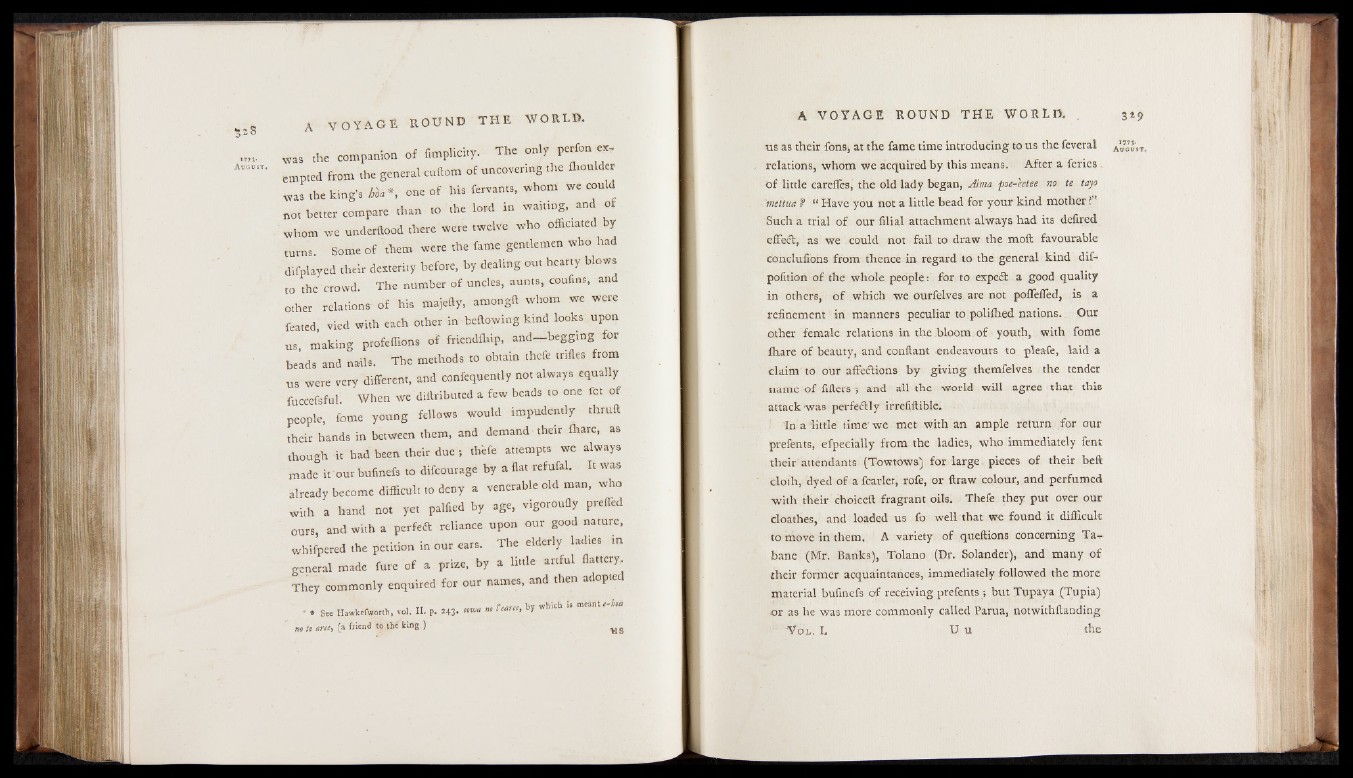
3' was the companion of fimplicity. The only perfon e ,
M empted from the general cuftom of uncovering the fhoulder
was the king’s one of his fervants. whom we could
n o t better compare than to the lord in waiting, and of
whom we underftood there were twelve who officiated by
turns. Some of 'them were the fame gentlemen who had
difplayed their dexterity before, by dealing out hearty blows
to the crowd. The number of uncles, aunts, coufins, and
other relations of his majefty, amongft whom we were
feated, vied with each other in bellowing kind looks upon
us, making profeffions of friendffiip, and— begging for
beads and nails. The methods to obtain thefe trifles from
us were very different, and confequently not always equally
fuccefsful. When we dillributed a few beads to one fct of
people, feme young fellows would impudently thruff
their hands in between them, and demand their ffiare, as
though it had been their due ; thefe attempts we always
made it our bufinefs to difcourage by a flat refufal. It was
already become difficult to deny a venerable old man, who
with a hand not yet palfied by age, vigoroufly prefled
ours, and with a perfeft reliance upon our good nature,
whifpered the petition in our ears. The elderly ladies in
general made fure of a prize, by a little artful flattery.
They commonly enquired for our names, and then adopted
• * See Hawkefworth, vol. II. p. 243* awa m r “ ‘ rle< wh‘ch “ mnat
no te am , (a friend to the king.)
us as their fons, at the fame time introducing to us the feveral A'„0” 'ST.
relations, whom we acquired by this means. After a feries k
of little carefles, the old lady began, Aima poe-eetee no te tayo
mettua ? “ Have you not a little bead for your kind mother!”
Such a trial of our filial attachment always had its defired
effect, as we could not fail to draw the moft favourable
conclufions from thence in regard to the general kind dif-
politioti of the whole people; for to expeiSt a good quality
in others, of which we ourfelves are not poflefied, is a
refinement in manners peculiar to poliffied nations. Our
other female relations in the bloom of youth, with fome
lhare of beauty, and conftant endeavours to plea-fe, laid a
claim to our affections by giving themfelves the tender
name o f fillers ; and all the world will agree that this
attack-was perfectly irrefiftible.
■ In a little time we met with an ample return for our
prefents, efpecially from the ladies, who immediately fent
their attendants (Towtows) for large pieces of their beft
cloth, dyed of a fcarlet, rofe, or ftraw colour, and perfumed
with their choice!! fragrant oils. Thefe they put over our
Cloathes, and loaded us fo well that we found it difficult
to move in them. A variety of queftions concerning Ta-
bane (Mr. Banks), Tolano (Dr. Solander), and many of
their former acquaintances, immediately followed the more
material bufinefs of receiving prefents ; butTupaya (Tupia)
nr as he was more commonly called Parua, notwithstanding
V ol. I, U u the